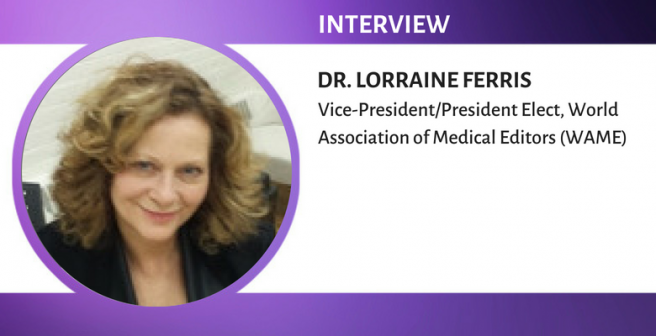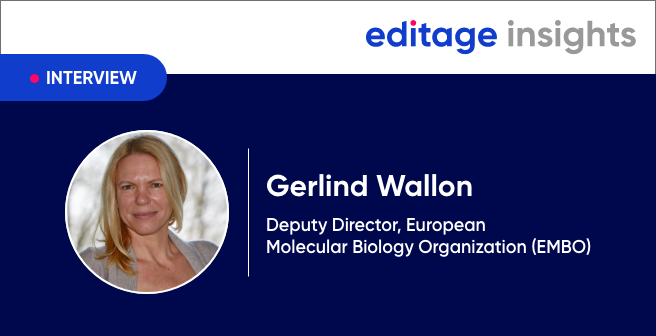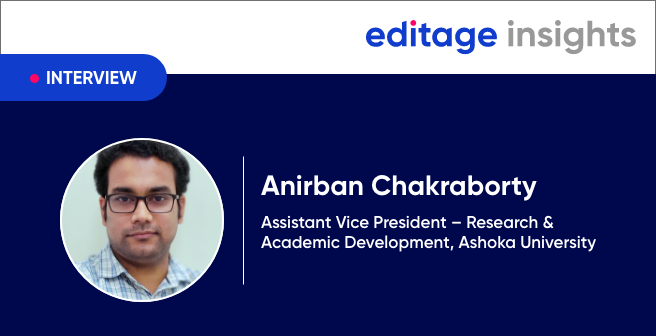WAME – Engaging journal editors for higher standards around the world

Dr. Lorraine Ferris is President of the World Association of Medical Editors (WAME) after having served in the past as its Secretary and Vice-President. She also chairs WAME’s Ethics and Policy Committee. She is a tenured professor in the Dalla Lana School of Public Health, University of Toronto, and a Senior Scientist at the Institute for Clinical Evaluative Sciences. She is on secondment from the School of Public Health to serve as the University of Toronto’s Associate Vice-President, Research (Oversight and Compliance), where her office includes legal services, research ethics, and research financial reporting and audit. Dr. Ferris has helped create institutional frameworks and processes within her office to deal with allegations of research misconduct, and works to increase awareness of research integrity through a university-wide committee that she chairs.
She has served as a member of the editorial board at The International Journal of Occupational and Environmental Health, Medicine and Law, and Risk Management in Canadian Health Care.
Dr. Ferris holds a PhD in Applied Psychology from University of Toronto, is a licensed psychologist, and has two Master of Law degrees (alternative dispute resolution, and administrative law) from Osgoode Hall Law School at York University. Her research interests include medico-legal policy, public health, women’s health, and health services research, with over 100 publications, including an editorial (with Robert A. Fletcher): “Conflict of Interest in Peer-Reviewed Medical Journals: The World Association of Medical Editors (WAME) Position on a Challenging Problem” [Published in many medical and biomedical journals whose editors are members of WAME].
What motivated you to serve as President at WAME?
I strongly believe in WAME’s mission, which is to promote the best of scientific medicine as a way to improve the health of the public worldwide. It is important to me that WAME is non-profit, and it excites me to work with an association that facilitates world-wide cooperation and communication among editors of medical journals, improves editorial standards and professionalism, and promotes research in peer-review and medical editing. All WAME officers, board members, committee chairs, and committee members are volunteers who devote their time to our mission, and I am honored to work with this talented and dedicated group of colleagues.
Can you give us an overview of your priorities for WAME?
WAME is a large association (more than 1915 members representing more than 1000 journals from 92 countries) and a major priority for WAME is education and outreach. The report from our Strategic Planning Meeting in September 2013 highlighted a priority on educating new members about editorial standards, outreach to other global organizations with complementary missions, and enhancing service to our members. We have embarked on a number of education and outreach initiatives this year in keeping with our strategic plan. A major priority follows from our announcement in Sept 2013 that we will be holding our first WAME International Conference for Medical Journal Editors. We are currently planning that conference to be held in New Delhi, India October 2-4, 2015. Another important initiative is our recent collaboration with other organizations to produce principles of transparency and best practice in scholarly publications, which we expect will be helpful to our members. Another major initiative was the launch of our new WAME website which has service enhancements for our members.
To help us meet our priorities, WAME relies on volunteers and its members. We have six Standing Committees: Education; Ethics and Policy; Finance; Membership; Research and Web, as well as four Officers and a Board of Directors. Much of WAME’s work is done through one or more of these Committees or groups.
Today WAME is the cited resource for authors and journals. It has established standards across international journals. Are you able to give us a brief history of how WAME emerged to be so prominent in scholarly communication?
WAME was established in 1995 by a dedicated group of medical editors, physicians and scientists from 13 countries who attended an international meeting about the deficiencies in medical editing standards, and lack of medical editor training or formal editor networking opportunities. Since then, WAME has addressed these issues and continues in its efforts to do more through its commitment to education and outreach. Many of those who attended that first international meeting remain as valuable WAME members who have held a number of leadership roles within our Association. Through our efforts to establish editing standards over the past two decades, we have connected with many journal editors and had the opportunity to work collaboratively with them, which helped us in building a reputation among editors, publishers, peer reviewers, and authors.
How important is global cooperation and communication among medical editors to improve editorial standards of peer-reviewed medical journals?
Science is global; so is WAME. To improve editorial standards, it is essential to understand the current status quo and obstacles facing journal editors and others in the peer-review and publishing process. As there are global differences in this regard, it is essential that any initiative to improve editorial standards engages journal editors from around the world and seeks their cooperation and willingness to share needed information. As a global association, WAME has been able to improve editorial standards because its members support this work and are willing to communicate with one another and cooperate on relevant initiatives.
How does WAME stay informed of international themes and issues pertaining to medical editing?
We have a number of ways to stay informed. Our officers and board members are from all over the world and each brings his/her experiences and expertise to their WAME work. We also have a very active WAME listserv available to all our members, which has proven to be an essential and valuable means of communication about medical editing and peer-review. Our members use this listserv to facilitate discussions and share information about issues and trends. Lastly, we are engaged in discussions and initiatives with other groups with complementary goals, and this helps WAME stay informed about international themes and issues in medical editing and peer-review.
For Asian, Arab, Latin American, or African regions, are there any obstacles such as sovereignty or practicality for joining such a worldwide standard?
Many regions across the globe do not have stable Internet access or have very slow access, which can be an obstacle for participating in our virtual association and for accessing peer-reviewed literature. We are pleased to see that generally these members still subscribe to our listserv, which likely means they are receiving and benefiting from this forum. Small journals face different obstacles than larger ones, and while this is not geographically specific, we do recognize the uniqueness of these journals. We have a task force on Small Journals and from that we are learning more about their obstacles in order to better offer education and outreach. Many of WAME’s experienced journal editors from various sized journals dedicate a great deal of time helping other journal editors through their involvement in our listserv discussions. Geography can sometimes be an obstacle for editors to attend events because of various kinds of travel constraints. We work with many regional associations of medical editors (e.g., EMAME, APAME, and FAME) from across the globe and this helps in our joint efforts to reach editors in their own geographic areas.
Per WAME, central to promoting professionalism in medical editing are “self-regulation” and “self-criticism.” Can you tell us how one achieves this?
WAME is an association that promotes professionalism, including self-regulation. We believe in the importance of journal editors promoting research on peer-review and medical publishing and considering these studies for publication in their journals. Through policy we encourage our members to monitor their journal’s performance and obtain external evaluations on the journal’s effectiveness. In addition to policy, the WAME listserv provides a forum for encouraging self-regulation. Members often discuss and debate new research about peer-review and editorial and publishing processes, and learn from each other about best practices.
While authors can follow WAME’s suggested guidelines to resolve conflict of interest issues on their end, authors have voiced concerns regarding COI on the journal’s end due to a lack of transparency. What are your thoughts on this?
WAME has a statement on conflict of interest in peer-reviewed medical journals that outlines key elements that our association believes journals should address in their own conflict-of-interest policies. Following that guidance will increase transparency in terms of possible conflicts of interest of authors, peer reviewers, and editors. We also have a policy on the relationship between journal editors-in-chief and journal owners (e.g., publishers) that is much broader in scope than possible conflicts of interest and that addresses the importance of editors-in-chiefs acting reasonably and having full authority over the editorial content of the journal. WAME believes that transparency is essential for ensuring public trust and for promoting the best of scientific medicine as a way to improve the health of the public world-wide.
Last year, WAME visited New Delhi, India. Can you share with us some of the event highlights?
WAME supported the November 2013 annual conference of the Indian Association of Medical Journal Editors (IAMJE) that was held at the All India Institute of Medical Sciences (AIIMS) in New Delhi. Invited speakers included editors from India and abroad and in all, about 180 participants attended; mostly from different states in India. There were two simultaneous workshops for medical writers as well as for reviewers. The workshops and seminar were practical sessions that involved high participation from the invited speakers and audience as they tackled real life problems faced by editors.
Thank you, Dr. Ferris.
WAME’s prior president, Dr. Peush Sahni, will help host the first ever WAME International Conference for Medical Journal Editors in New Delhi, India October 2-4, 2015. WAME will soon be accepting abstracts. Please watch WAME’s website for new information and consider attending if you are a medical journal editor.
Disclaimer: WAME does not endorse any services or products.
This interview was conducted by Alagi Patel.



